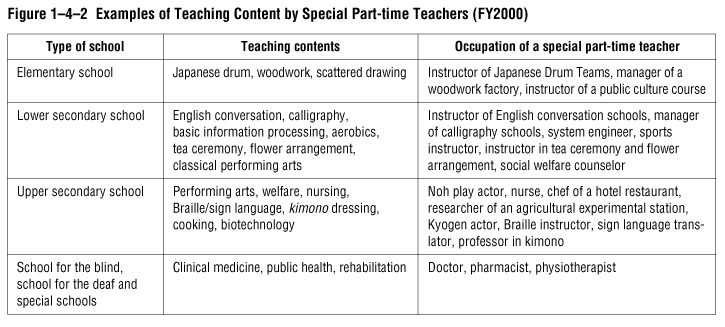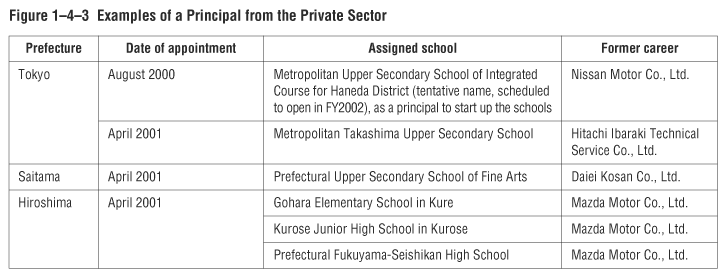| Home > Policy > White Paper, Notice, Announcement > White Paper > Japanese Government Policies in Education, Culture, Sports, Science and Technology 2001 >Chapter4 Section1.2 | ||
Schools should live up to the expectation of parents and residents by providing creative and distinctive education under the leadership of principals, in accordance with the situations of children and communities. In order for schools to fulfill such responsibilities, it is important to establish school autonomy and self-discipline by making schools open to surrounding communities and expanding their level of discretion.
In order to unite schools with families and communities in the education of children, schools should make efforts to be accountable in giving full explanations of their concrete educational targets and activities. Schools that are held accountable are also required to conduct a self-evaluation of targets and activities, of which the results should also be reported to parents and local residents.
The December 2000 report of the National Commission on Education Reform makes recommendations to the same effect, and MEXT, in its Education Reform Plan for the 21st Century, proposed the introduction of a school adviser system and school self-evaluation system to make schools more open and responsive to surrounding communities.
The school adviser system was institutionalized in April 2000. It is a mechanism whereby a school principal reflects the opinions of parents and local residents in school management. As of April 2001, about 90% of prefectures and designated cities and about 40% of municipalities had set up or decided to create School Councilor or other similar positions.
The introduction of the school adviser system will work toward increasing opportunities for schools to explain their educational targets, plans and implementation status and perceived public views can be reflected in school-building. It will also make it possible that schools more actively promote various educational activities including the Period of Integrated Study, experiential learning, school events and extracurricular club activities with the understanding of and cooperation from parents and local residents. In particular, the school adviser system is expected to serve as a countermeasure to juvenile crimes and other problematic incidents when communication and coordination among schools, families and communities are strongly needed to prevent such incidents. It is hoped that this system will be actively utilized in the effort to build confidence in schools and that schools in close coordination with families and communities support the growth of children.
With respect to a school's self-evaluation, each school ought to evaluate its own management and activities, and fulfill its accountability to parents and local communities by announcing evaluation results, which should then be used to improve school management and educational activities. MEXT intends to prepare necessary provisions concerning self-evaluation in a ministerial ordinance by the end of FY2001.
Boards of education are expected to take measures to expand the discretion of each school, so that it can extend distinctive educational services in accordance with the situations of its students and the surrounding community. An example of one such measure is the revision of School Management Regulations, which define the relationship between boards of education and schools. As of April 2001, 31 prefectures revised the regulations. One such revision, for example, was to require schools to file reports with the board of education but not to require board approval like in the past.
As for school budgets, the preference of each school should be accommodated as much as possible by holding budget preparation sessions and securing a special outlay under the principal's discretion. MEXT, for its part, has defined educational standards more broadly and flexibly. For instance, it has established a Period of Integrated Study and expanded the range of elective courses in school curriculum.
In addition, the Law Concerning Organization and Functions of Local Educational Administration was amended in June 2001, specifying that municipal boards of education must attach, if applicable, the opinions of principals to education reports submitted to prefectural boards on personnel changes of teachers or payroll. This amendment intends to expand principals' discretion and MEXT will continue to make efforts to expand the discretion of each school.
|
- Akita Prefectural Board of Education Hometown Dream-up Project The Hometown Dream-up Project has been carried out since FY1999. It aims to raise children with rich spirits and practical abilities by developing their dreams and self-initiated activities and supporting the Period of Integrated Study that will be fully implemented in FY2002. Each school relates this project to the Period of Integrated Study, and promotes an experiential, problem-solving approach to learning through observations, research and manufacturing activities.
Eligibility: Public and private elementary and lower secondary schools as well as special education schools in the prefecture
Budget per school: Approximately 500,000 yen (determined based on an application from each school) Major contents of the project: Breeding and cultivation, crafting, outdoor activity, research on traditional arts - Kochi Prefectural Board of Education Project on the Promotion of High School Plan 21 and Project on the Promotion of School Planning The projects have been ongoing since FY2000 as educational reforms in the region. They aim to promote distinguished and revitalized education though responsible and creative activities by taking advantage of the individual characteristics of each student, school or community. The projects contribute to the improvement of school management under the leadership of a principal and the self-initiative of a school.
Eligibility: Prefectural upper secondary schools and special education schools in the prefecture
Budget per school: 500,000 yen to 6.5 million yen (determined based on an application from each school) Major contents of the project: Crafting, career guidance in cooperation with universities, education for international understanding, the building of schools more open to the community |
Participation in school education by working adults and local residents, who have a wide range of experiences and excellent knowledge and skills, is particularly important in building schools more open to society and realizing diverse and vigorous school education. In order to facilitate such participation, the following measures have been taken.
| {1} Utilization of Part-time Outside Teachers (Special Arrangements for Part-time Teachers without Teacher Certificates, etc.) |


| {2} Appointment of a Principal from the Private Sector |

| Back To Top | MEXT HOME |